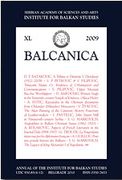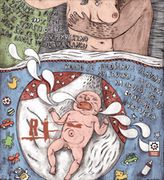
The Legacy of King Alexander I of Yugoslavia, the Unifier
The Legacy of King Alexander I of Yugoslavia, the Unifier
On the occasion of the 75th anniversary of assassination
More...
On the occasion of the 75th anniversary of assassination
More...
Il s’agit d’un programme de recherche collective sur les Balkans qui est en voie d’achèvement. Le titre complet est : « Pour une grande histoire des Balkans des origines aux guerres balkaniques. Unité culturelle et particularismes, identités culturelles et dialogues interculturels », tome I, Paris 2004, in-8°, 246 pages, avec 6 cartes ; tome II (à paraître) ; tome III, Paris 2009, in-8°, 396 pages.
More...Keywords: migration; Africa; EU; history; geography; migration factors
The article gives a comprehensive analysis of the most important factors that have contributed through historical development to the interweaving between the African and European migration system and/or the increase in migration flows between those regions. The historical sketch commences from the end of the 19th century, when political and/or colonial relations between the European and African regions intensified. While a gradual increase in the African migration population, travelling almost exclusively to the most influential European colonial centres, was noted in the first half of the 20th century, a major change in the development of migration on that route occurred from the 1960s, with increasingly more African countries gaining their independence. In more recent history, an important turning-point occurred around 1990, when major socio-political changes came about, both on the territory of Europe and of Africa. The causes for that type of migration had always been very complex and had been linked to processes and factors on both sides. Various measures in favour of migration from countries outside the region of the European Economic Community that were introduced from the early 1970s did not produce the desired effects while, to the contrary, some restrictions even stimulated certain types of migration from the African continent. Notwithstanding the fact that, in the quantitative sense, the majority of African migrants and/or foreign citizens continue to be concentrated in the former colonial centres, those centres have not been the sole regions of mass migration from Africa for some time now.
More...Keywords: religion; confession; ritual; South-Eastern Europe; historical anthropology; Christianity; Judaism; Islam
The article approaches religious phenomena in South-Eastern Europe in a historico-anthropological manner. With the aid of historical comparison, the author tries to throw light on the religious phenomena of South-Eastern Europe and to present them in a lucid review. A significant place in this process is given to historical sociology as a discipline which, among other, also deals with the religious conditioning of social processes. The text consists of two parts. In the first, the author deals with the question of the religious particularity of South-Eastern Europe and considers it from several viewpoints. The author regards the most important features of the religious situation in that part of Europe as being particularism, archaicism and syncretism. He analyses the historical conditioning of the viability of the three monotheistic world religions in the region, their influence on the social development of South- Eastern Europe, the stance of the authorities towards religious communities and the existence of diverse traditions within individual religious cultures. Along with analysis of the presence of ancient elements and the continuity of pre-Christian rituals and beliefs, the author also stresses the strong syncretism marking the religious traditions of South-Eastern Europe. In the second part of the text the author compares religious phenomena in South-Eastern Europe and analyses regional religious traditions. He presents from the historico-anthropological aspect the religious rituals, the bearers of rituals, the place and time of rituals and the ritual languages of each of the world religions represented in the region. Emphasising the continuity of religious life and religious traditions in South-Eastern Europe, the author ends with the period of Communist rule in the second half of the 20th century, and deliberation that Communism, too, with its atheist doctrine in the secular form of cult, in fact carried on from religious tradition.
More...Keywords: labour market; long-term unemployment; inflexibility; mismatch; work permits; migration flows
The Croatian labour market is characterised by a low degree of activity on the part of the population, a high unemployment rate, a pronounced problem with long-term unemployment and a high structural disproportion between supply and demand. Because of the relatively high share of the unofficial economy, there is a large difference between the administrative unemployment rate and that shown by surveys. Analysis of the situation on the Croatian labour market shows that significant structural issues still remained unsolved (such as inflexibility, mismatch between supply and demand with respect to profession and education, and similar). There is still very limited creation of new jobs. The employment rates of men and women and the employment of young people are among the lowest in comparison with the EU-27 and are far from attainment of the Lisbon objectives. The high rate of economic inactivity indicates the lack of utilisation of the existing work force potential. The conducted research shows that the continued advised needs for workers is 25 time higher than the annual number of approved work permits to foreigners from 1992 to 2006, while that number was negligible in 1991. Due to this situation, Croatia still has a very strict protectionist orientation towards employing foreigners, although the fact is that this situation will have to change very quickly with accession to the EU. It can be concluded that no major changes in migration flows or any significant shifts in employment and unemployment rates can be expected until the year 2010. Although opening the borders could mean, on the one hand, the possibility of increased emigration of the Croatian work force, the expectations are that such movements, nonetheless, will not occur. It is more likely that opening borders would be connected with greater mobility of workers, both from Croatia into other countries and from other countries towards Croatia.
More...Keywords: classification; power; social system; population census; ethnic groups; institutions; classification schemes
The paper discusses the influence of ideological and scholarly-ethnographic classification schemes, as well as those pertaining to population censuses, on the formation of ethnic identities and ethnic structure in Civil Croatia and Slavonia from 1785 to 1860. Proceeding from the theory of social systems and institutions, the author examines the power of classification schemes and their influence on the construction of ethnic identities. It has been shown that changes in social orders also lead to changes in the principles of constructing classification schemes. Thus, in the modern social order, the combination of commonsensical, ideological, scholarly and official statistic classification schemes led to the creation of a specific ethno-nationalist discourse, which strongly influenced the formation of ethnic identities, overcoming traditional ethnic particularities and formation of modern ethnic communities on the territories of Civil Croatia and Slavonia in the early modern period.
More...Keywords: ethnocentrism; traditionalism; authoritarianism; conformism; religiosity; social conservatism
This paper presents the results of research through which an endeavour was made to establish the predictive importance of various authoritarian tendencies (traditional gender roles, authoritarian obedience, conformism) in relation to expressions of ethnocentrism, whose structure of attitudes indicates nationalistic sentiment. The second objective of the research was to determine the influence of declarative religiosity on the latent configuration of ethnocentrism and the variables of authoritarian tendencies. The research was conducted on a sample of first-year students at the University of Zagreb (N = 223). The homogeneity of the measuring instruments was checked by factor analysis with a varimax rotation, and their reliability was calculated by the Cronbach co-efficient. In further multivariate data processing, factor extracted dimensions were used. The results of regression analysis showed that traditional gender roles (patriarchalism) and conformism are significant predictors of ethnocentrism. The approximately 31% ethnocentrism variance was explained by predictor variables. The results of canonical discrimination analysis showed the considerable influence of declarative religiosity on the latent configuration of ethnocentrism and authoritarian tendencies. The structure of the canonical factor indicates the existence of a pattern of attitudes and values of a higher order, called “social conservatism”. A relatively small percentage of variance (around 12%) in the examined variables set can be attributed to differences in declarative religiosity, which points to the relatively modest significance of religiosity in the forecasting of social conservatism. Although the results of research comply with other researches conducted in Croatia on samples of the general population, the author shows, on the example of Voyvodina, that the interrelations of ethnocentrism, authoritarian tendencies, conformism and religiosity are not uniform in a society with people living in a different cultural heritage and political context .
More...Anđelko Akrap, Ivan Čipin Socijalitetni sterilitet u Hrvatskoj –zašto smo neoženjeni i neudane Zagreb: Ministarstvo obitelji, branitelja i međugeneracijske solidarnosti, 2006, 170 str. Maja Brkljačić, Sandra Prlenda (ur.) Kultura pamćenja i historija Zagreb: Golden marketing – Tehnička knjiga, 2006, 416 str. Milana Černelić Bunjevačke studije Zagreb: FF press, 2006, 318 str. Jasna Čapo Žmegač Strangers Either Way: The Lives of Croatian Refugees in Their New Home New York – Oxford: Berghahn Books, 2007, 216 str. Stanko Jambrek (ur.) Leksikon evanđeoskoga kršćanstva Zagreb: Bogoslovni institut – Prometej, 2007, 443 str.
More...Keywords: quality of life; satisfaction; objective indicators; temperament; demographic variables; national minorities
The Quality of Life in Croatia – the Connection between Subjective and Objective Indicators as well as Temperament and Demographic Variables with a Reference to Minority Status The objective of this study was to establish predictability of different demographic and psychological variables as well as some indicators of health and socioeconomic status on general life satisfaction and satisfaction with specific domains of life. Life satisfaction was measured with Quality of Life Scale, dimensions of temperament with Pavlovian temperament survey and demographic variables, health and socioeconomic status indicators with general data questionnaire on a sample of 251 subjects. In order to encompass participants of diverse ethnic affiliation in Croatia the sample included Croats and the members of four minority groups: Serbian, Italian, Czech and Slovenian. Significant predictors accounted for 15% variance of general life satisfaction, and satisfaction with life in the past year, while the percentage for specific domains of life satisfaction varied from 2 to 30%. There were no significant differences between these groups in general life satisfaction, and there was only one statistically significant difference for satisfaction with specific life domains: the members of the majority group were less satisfied with society in which they live and rights they have than the members of the minority groups.
More...
Keywords: Fabrika knjiga; Publisher; Belgrade Book Fair Awards
More...
Harold Bloom, The Anatomy of Influence: Literature as the Way of Life (New Haven & London, Yale University Press, 2011, 357 str.)
More...

Keywords: Bal Mieke
More...
Keywords: Slovenia; politician; Branko Grims; Mladina
More...





Keywords: Ukraine; Roamnia; Azerbaijan; oppositions; Poland; Radoslaw Sikorski; Donetsk; Russia; OSCE; Titus Corlatean; Ilham Alliev; Irakli Garibashvili; Georgia;
Plus, the Azerbaijani opposition holds a new anti-Aliev demonstration, and Poland’s Sikorski survives a no-confidence vote. Around the Bloc is TOL's daily digest of the important, the trivial, the tragic, the weird, and the sober from its coverage region.
More...